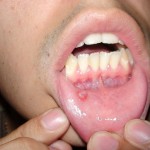Mucocele
A mucocele (MEW-koh-seal) is a “mucous retention cyst” that forms as a result of a salivary gland becoming blocked. It manifests itself as a lump that is firm to the touch, and may fluctuate in size. Discovering a mucocele can, at first, be very alarming, since lumps in one’s mouth can be a sign of Oral Cancer. However, mucoceles are quite common, and usually occur on the inside of the lower lip. However, mucoceles can occur anywhere there is a salivary gland to get clogged, such as inside your nose or throat.
How do I know if I have a mucocele?
To find out if you have a mucocele, see your doctor if any abnormality persists for two weeks. Mucoceles are lumps that are very firm to the touch, painless, and often have a bluish color to them.
What causes mucoceles?
Mucoceles are usually caused by trauma of some sort to a salivary gland. This can happen if you bite your lip, or get hit in the lip. The trauma can cause the duct in the salivary gland to get clogged, thus causing a mucocele to develop.

WANT TO WRITE A BOOK?
Download your FREE copy of How to Write a Book »
(for a limited time)
What should I do if I think I have a mucocele?
A mucocele can be diagnosed by your doctor, or your dentist, but it will ultimately have to be removed by an oral surgeon. Most patients decide whom to see based upon what health insurance options they have. If you have health insurance, and your plan allows you to directly to an oral surgeon, you may choose to do that. Otherwise, you may need a referral from your primary care physician. Check with your health insurance company.
How are mucoceles treated?
In rare cases, mucoceles will go away on their own, but they usually have to be removed through minor oral surgery. Local anesthetic is administered so no pain will be felt, the doctor cuts the skin with a scalpel, then removes the mucocele. Surrounding salivary glands often get irritated and are typically “plucked” out. The cut is then stitched up, and the mucocele sent for testing. Surgery can sometimes cause trauma to other salivary glands – and thus, more mucoceles.
Here is a video of a mucocele removal surgery.
How long does it take to recover from mucocele removal surgery?
If you have a mucocele surgically removed, you will probably need to rest for about a day. You will experience some pain in the area, and will either be prescribed pain medication, or be directed to take an over-the-counter pain reliever, such as ibuprofen. You will probably have to eat very soft foods – such as soup – for 3-5 days, and have limited range of motion of your lips and mouth (such as for smiling) for about two weeks. Some surgical scars may be present after recovery.
All information is intended for your general knowledge only and is not a substitute for medical advice or treatment for specific medical conditions.


